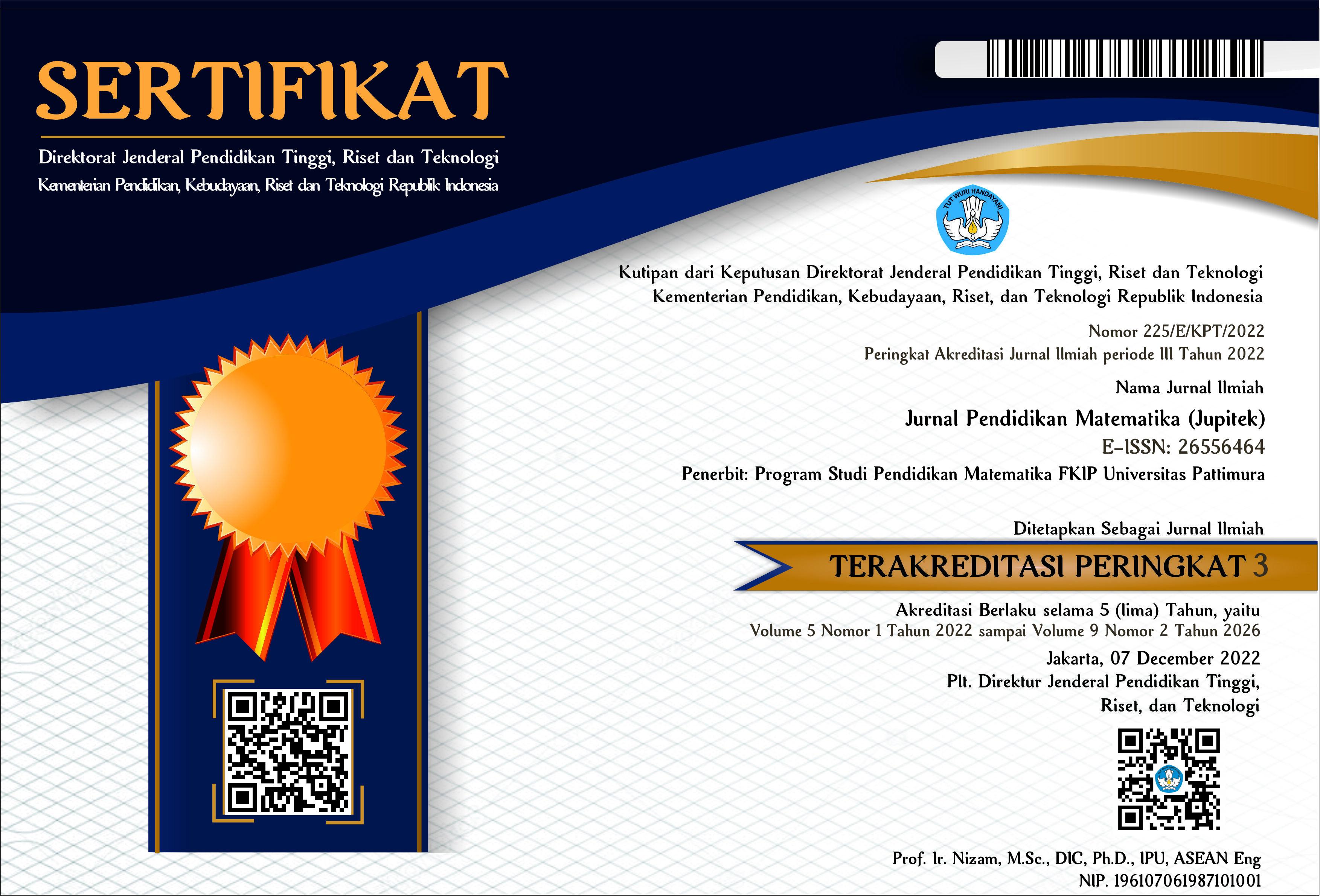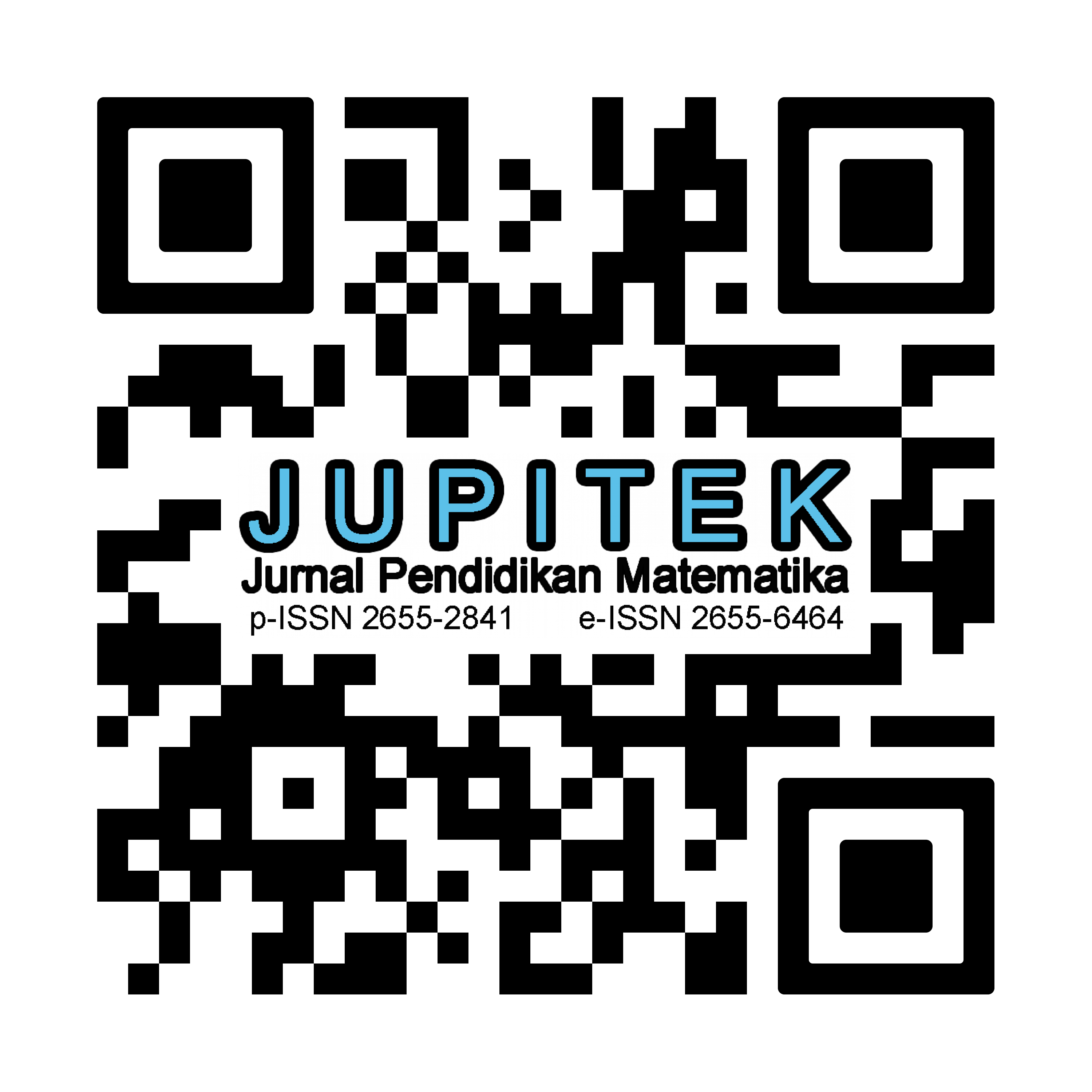ANALISIS KEMAMPUAN SISWA DALAM MENYELESAIKAN SOAL UJIAN NASIONAL MATEMATIKA SMP/MTs BERDASARKAN PERSPEKTIF HIGHER ORDER THINKING SKILLS (HOTS)
Abstract
This study aims to analyze the ability of mathematics junior high school students in resolving the mathematics HOTS in the national exam (UN). The methodology used is a descriptive qualitative study. The subject of study is six students of ninth grade consisting of two capable, two people are low capacity, and two others high-profile. Data collection in this research using interviews and test one package the exam every year from 2016-2018, then been validated by the expert, who is elected seven items of about which include an item in 2016, two items of the year 2017, and four items of the year 2018. An instrument used is an enlightenment interview and the national exam in HOTS categorize. The result showed that students low capable with only able to solve the item number-1 and number-4 wich including in HOTS level-4 and 5, and students who are capable of being able to solve problems HOTS have similarities with students who are highly capable of being able to solve the questions number 1, 2, 3, 4, and 7 with HOTS levels 4, 5, and 6
Downloads
References
Ahmad & Sukiman, 2019. Analisis Higher Order Thinking Skills (HOTS) Pada Soal Ujian Akhir Siswa Kelas 6 Kmi Dalam Kelompok Mata Pelajaran Dirosah Islamiyah Di Pondok Modern Tazakka Batang. Jurnal Pendidikan Agama Islam, 16 (2), 137-164.
Anderson, Lorin. W & David R. Krathwohl (Eds). 2010. Kerangka Landasan untuk Pembelajaran, Pengajaran, dan Asesmen: Revisi Taksonomi Pendidikan Bloom. Terjemahan oleh Agung Prihantoro. Yogyakarta: Pustaka Pelajar.
Basuki & Hariyanto, 2016. Asesmen Pembelajaran. Bandung: PT Remaja Rosdakarya.
Gais, Z & Afriansyah, E.A. 2017. Analisis Kemampuan Siswa Dalam Menyelesaikan Soal High Order Thinking Ditinjau Dari Kemampuan Awal Matematis Siswa. Jurnal “Mosharafaâ€, 6(2), Mei 2017. (online), https://media.neliti.com/media/publications/226677-analisis-kemampuan-siswa-dalam-menyelesa-e86fba01.pdf
HDI. 2016. Human Development for Everyone Briefing note for countries on the 2016 Human Development Report. http://www.id.undp.org/content/dam/indonesia/2017/doc/INSIndonesia_Country%20Explanatory%20Note_HDR2016.pdf
Heong, YM, Yunos, J. Md., Othman, W., Hassan, R, Kiong, T.T., Mohamad, M.M. 2012. The needs analysis of learning higher order thinking skills for generating ideas. Procedia - Social and Behavioral Sciences 59 (2012): 197 – 203.
Kusuma, M. D., Rosidin, U., & Suyatna, A. 2017. The Development of Higher Order Thinking Skill HOTS Intrument Assesment in Physics Study. IORS Journal of Research & Method in Education , 7 (1), 26-32.
Nugroho, & R., Arifin. 2018. HOTS, Kemampuan Berpikir Tingkat Tinggi, Konsep, Pembelajran, Penilaian dan Soal-soal. Jakarta: PT Gramedia.
Permendiknas No. 63 Tahun 2009 Tentang Sistem Penjaminan Mutu Pendidikan.
Pusat Penelitian Pendidikan (Puspendik). 2019. Laporan Hasil Ujian Nasional SMP Tahun Ajaran 2018/2019. Jakarta: Kemdikbud.
Qoni’ah, L. 2017. Analisis Soal Ujian Nasional Matematika Tingkat Smp/Mts Tahun 2013-2015 Berdasarkan Perspektif Higher Order Thinking Skill (Hots) : skripsi
Wang, S & Wang, H. 2014. Teaching and Learning High Order Thinking. International Journal of Arts & Sciences, 07(02):179–187.
Morteza Teimourtash & Massood Yazdani Moghaddam. 2017. On the Plausibility of Bloom’s Higher Order Thinking Strategies on Learner Autonomy: The Paradigm Shift. Asian-Pacific Journal of Second and Foreign Language Education, DOI 10.1186/s40862-017-0037-8.
Syarbaini, S. 2016. Kesadaran Berbangsa Dan Bernegara. http://ueu5483.weblog.esaunggul.ac.id/2016/05/page/2/
Copyright (c) 2020 Yohanis Ndapa Deda, Astry H Ratu, Stanislaus Amsikan, Oktovianus Mamoh

This work is licensed under a Creative Commons Attribution-NonCommercial-ShareAlike 4.0 International License.
License and Copyright Agreement
By submitting a manuscript to Jurnal Pendidikan Matematika (JUPITEK), the author(s) certify and agree to the following terms:
- Originality and Authority: The submitting author is authorized by all co-authors to enter into this agreement. The manuscript describes original work that has not been published previously in a peer-reviewed journal, nor is it under consideration for publication elsewhere.
- Approval: Its publication has been approved by all author(s) and by the responsible authorities of the institutions where the work was carried out.
- Rights: The authors secure the right to reproduce any material that has already been published or copyrighted elsewhere.
- Licensing and Copyright: Authors retain the copyright to their work.
- License Grant: The authors grant Jurnal Pendidikan Matematika (JUPITEK) the right of first publication, with the work simultaneously licensed under the Creative Commons Attribution-NonCommercial-ShareAlike 4.0 International (CC BY-NC-SA 4.0).
- Self-Archiving: Authors are permitted and encouraged to deposit the published version of their article in institutional repositories, on their personal websites, and other academic platforms, with proper acknowledgment of its initial publication in Jurnal Pendidikan Matematika (JUPITEK).






.png)


